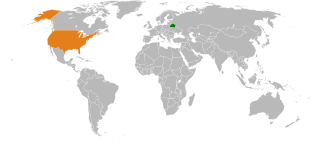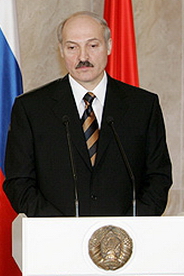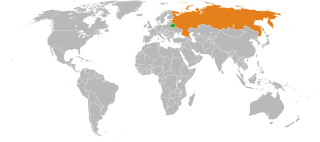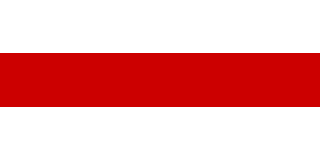Related Research Articles

Belarus, officially the Republic of Belarus and formerly known as Byelorussia or Belorussia, is a landlocked country in Eastern Europe. It is bordered by Russia to the northeast, Ukraine to the south, Poland to the west, and Lithuania and Latvia to the northwest. Its capital and most populous city is Minsk. Over 40% of its 207,600 square kilometres (80,200 sq mi) is forested. Its major economic sectors are service industries and manufacturing. Until the 20th century, different states at various times controlled the lands of modern-day Belarus, including Kievan Rus', the Principality of Polotsk, the Grand Duchy of Lithuania, the Polish–Lithuanian Commonwealth, and the Russian Empire.

The Byelorussian SSR was one of only two Soviet republics to be separate members of the United Nations. Both republics and the Soviet Union joined the UN when the organization was founded in 1945.

The politics of Belarus takes place in a framework of a presidential republic with a bicameral parliament. The President of Belarus is the head of state. Executive power is exercised by the government, at its top sits a prime minister, appointed by the President. Legislative power is de jure vested in the bicameral parliament, the National Assembly, however the president may enact decrees that are executed the same way as laws, for undisputed time. Belarus's declaration of independence on 27 July 1990, did not stem from long-held political aspirations but from reactions to domestic and foreign events. Ukraine's declaration of independence, in particular, led the leaders of then Belarusian SSR to realize that the Soviet Union was on the brink of dissolving, which it did.

Alexander Grigoryevich Lukashenko or Alyaksandr Ryhoravich Lukashenka is a Belarusian politician, who has served as president of Belarus since the establishment of the office 26 years ago, on 20 July 1994. Before launching his political career, Lukashenko worked as director of a state farm (sovkhoz), and served in the Soviet Border Troops and in the Soviet Army.

The State Security Committee of the Republic of Belarus is the national intelligence agency of Belarus. Along with its counterparts in Transnistria and South Ossetia, it is one of the few intelligence agencies that kept the Russian name "KGB" after the dissolution of the Soviet Union, albeit it is lost in translation when written in Belarusian.

Interstate relations between the United States and Belarus began in 1991 upon the dissolution of the Soviet Union, of which Belarus had been a part. However, the relations have turned sour due to accusations by the United States that Belarus has been violating human rights. Belarus, in turn, has accused the United States of interfering in its internal affairs.

Presidential elections were held in Belarus on 19 March 2006. The result was a victory for incumbent President Alexander Lukashenko, who received 84.4% of the vote. However, Western observers deemed the elections rigged. The Organization for Security and Co-operation in Europe (OSCE) declared that the election "failed to meet OSCE commitments for democratic elections". In contrast, election observers from the Commonwealth of Independent States (CIS) described the vote as open and transparent.

Euro-Belarusian relations refers to relations between the Republic of Belarus and the European Union (EU). Mutual relations were initially established after the European Economic Community recognised Belarusian independence in 1991.

Russia is the largest and most important partner for Belarus both in the political and economic fields. The Treaty on Equal Rights of Citizens between Belarus and Russia was signed in December 1998, covering employment, and access to medical care and education. The two countries constitute the supranational Union State, it is also a member of the wider military alliance known as the Collective Security Treaty Organization, alongside other post-soviet nations. By 2020, however, the relationship Belarus and Russia had become described as "strained," with Belarus President Alexander Lukashenko accusing the Russian government of trying to make Belarus a part of Russia. Despite these tensions, the countries still maintain formal support for each other.

Belarus–Lithuania relations are foreign relations between Belarus and Lithuania. The countries established diplomatic relations on 24 October 1991, shortly after the dissolution of the Soviet Union. The two countries share 680 kilometres (420 mi) of common border. Vilnius hosts multiple Belarusian civil society organizations, such as European Humanities University, Belarusian refugees such as Sviatlana Tsikhanouskaya, remains of national heroes the two countries share like Konstanty Kalinowski and has been the birthplace of Belarusian literature.

Relations between Azerbaijan and Belarus are at very high level that Belarusian president Alexander Lukashenko describes Azerbaijan as a "saver" of independence and sovereignty of Belarus and adds that "there's not anything close" in Azerbaijani-Belarusian relations. Both countries were part of the Russian Empire until 1918 and before 1991, they were part of the Soviet Union. Azerbaijan has an embassy in Minsk and Belarus has an embassy in Baku. Both countries are full members of the Organization for Security and Co-operation in Europe (OSCE) and the Commonwealth of Independent States (CIS). Azerbaijan is a full member of the Council of Europe, Belarus is a candidate. Both Azerbaijan and Belarus are full members of the Non-Aligned Movement (NAM). There are more than 6,000 Azerbaijanis living in Belarus.

The Belarusian government is criticized for human rights violations and its persecution of non-governmental organisations, independent journalists, national minorities, and opposition politicians. In a testimony to the United States Senate Committee on Foreign Relations, former United States Secretary of State Condoleezza Rice labeled Belarus as one of the world's six "outposts of tyranny". In response, the Belarusian government called the assessment "quite far from reality". As at 2017, the Viasna Human Rights Centre lists two political prisoners, down from 11 in 2016 currently detained in Belarus.

Belarus–Netherlands relations are foreign relations between Belarus and the Netherlands. Both countries established diplomatic relations in 1994. Belarus has an embassy and an honorary consulate in The Hague. The Netherlands is represented in Belarus through its embassy in Warsaw (Poland) and through an honorary consulate in Minsk. Both countries are full members of the Organization for Security and Co-operation in Europe.

The Milk War was a trade conflict between Russia and Belarus in June 2009. Russia and Belarus have close relations and the conflict stemmed from Russia allegedly attempting to pay Belarus US$500 million to recognize the independence of Abkhazia and South Ossetia. Russia also expressed its interest in privatizing the Belarusian milk industry. Belarus responded by seeking negotiations with the European Union on certifying Belarusian milk according to EU regulations. Russia then banned the import of dairy products from Belarus, citing alleged health concerns. The trade conflict ended on June 17, 2009, when Russia announced that it would lift the ban.

Presidential elections were held in Belarus on 19 December 2010. The election was originally planned for the beginning of 2011. However, the final date was set during an extraordinary session of the National Assembly of Belarus on September 14, 2010.
Natalia Vladimirovna Petkevich is a Belarusian politician who served formerly as the First Deputy Head of the Administration of the President of Belarus.

The Belarusian democracy movement is an umbrella term used to describe Opposition groups and individuals in Belarus that seek to challenge the Belarusian government under President Alexander Lukashenko.
Teddybear Airdrop Minsk 2012 was an aerial event that took place over Belarus on July 4, 2012. An airplane, chartered by the Swedish advertising agency Studio Total, illegally entered the Belarusian airspace on July 4 and parachuted several hundred teddy bears with notes carrying pro-democracy messages. After denying for three weeks that the incident ever took place and calling the footage of the airdrop released by Studio Total a hoax, the Belarus government finally acknowledged on July 26, 2012, that the teddy bear airdrop did happen.
Events in the year 2020 in Belarus.
References
- ↑ "Background Note: Belarus". U.S. Department of State, Background Notes. United States Department of State. October 2008. Retrieved 2009-01-02.
- ↑ "EU imposes Belarus travel ban". BBC News. 2002-11-19. Retrieved 2009-01-02.